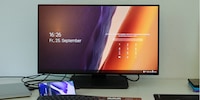
Product test
Samsung DeX on the Galaxy Note20 Ultra tested: The smartphone as a computer replacement - a self-experiment
by Jan Johannsen

DeX turns Samsung smartphones into mini PCs. While the desktop view has improved, it still struggles with some fundamental problems.
After a long hiatus, I tried Samsung DeX again with the Galaxy S24 Ultra. I wanted to know what improvements had been made in the last four years. At the time, my conclusion about the desktop view was that it works surprisingly well, but isn’t a permanent replacement for a PC.
I’ll divide my current observations into three areas:
Plug the USB-C cable from your monitor into the Galaxy and the Samsung DeX immediately starts. You may need to activate DeX before connecting it for the first time. But after that, all you need is to plug in the cable and the smartphone knows what to do. While desktop view is active, I can continue to use the smartphone as normal.

The advantage of the desktop view is that you can comfortably use your mouse and keyboard. With wireless models, you can pair them to your smartphone via Bluetooth. If you want to use devices with a cable, you can use a docking station. Even a USB hub with the right connections will do, and monitors with a hub should work just as well.
At a push, the smartphone’s touchscreen serves as a touchpad and you can also use it to display your keyboard. What’s more, the S Pen can serve as a mouse replacement. In mouse mode, you move the stylus across the touchscreen and the pointer moves at the same time.

I have access to all the apps on my smartphone. They start just as quickly with an external screen. Not only that, they also run smoothly.

DeX doesn’t push the smartphone to its performance limit. Even four years ago, the Galaxy Note 20 Ultra wasn’t unusually warm. This still applies to the Galaxy S24 Ultra with its even more efficient technology. After 30 minutes of a video call, it’s a pleasant hand warmer, but this is also the case without DeX. Besides, it’s far from being too warm.
Most of the improvements I noticed are from third parties rather than Samsung. But this doesn’t change the fact that these updates make the desktop view more usable.
DeX benefits from the increased performance of the Galaxy S24 Ultra. It offers significantly more power than the Galaxy Note 20 Ultra did four years ago. As a result, everything runs more smoothly and even larger Excel files can be opened and edited. Obviously, there are plenty of computers with more power.

I no longer have to laboriously set up my smartphone for a video call in Teams. If I have it lying sideways, Microsoft’s chat program automatically rotates the view of the front camera. You can now also blur the background, which wasn’t possible in DeX four years ago.
With Photoshop online, you can now use a (paid) image editing application via DeX that offers more functions than Adobe’s (free) Android apps. However, I use Lightroom to edit a lot of photos and there’s no online version. What’s more, the Android app is far from complete, a drawback I’m aware of from working with Chromebooks.
But I’ve now been able to solve a problem with DeX that also bothered me with Chrome OS. The mobile version of Google’s browser lacks the Chrome Web Store, meaning I can’t install any extensions. However, there is one that makes my work much easier. The solution: switch to Firefox. At the end of 2023, the mobile version of the Mozilla browser started offering add-ons, which means I can install the ones I need on DeX.
I continue to use Android apps with DeX. While it ensures a wide variety of usable programs, generally speaking, they’re not optimised for viewing on a large screen. That doesn’t make them unusable, but it doesn’t look that nice either.

I notice the same issue when operating it. Using touch control with the mouse is still a stopgap solution. Sometimes I have to double-click to carry out an action. In addition, the mouse pointer isn’t as fast as I’d like. I haven’t found any corresponding settings to adjust the speed. To make matters worse, the pointer occasionally stalls.
Another issue is the resolution. DeX achieves a maximum of Full HD, but my 27-inch monitor has WQHD. In other words, the display isn’t razor-sharp. This is fine for temporary use, but not for ongoing work. The display will look better on smaller Full HD screens.
A Samsung smartphone with DeX is perfect as a short-term PC replacement. If you’re going on a flight with minimal luggage and aren’t dependent on special Windows programs, you can get by with the desktop view for a few days. Provided the appropriate peripherals are available at your destination – otherwise a laptop would be the smaller choice.
However, DeX still isn’t enough to permanently replace a PC with a Galaxy smartphone. As soon as you rely on certain programs, there’s no way around Windows, Linux or macOS. But my biggest gripe is that the Android apps permanently drive me crazy. It’s the exception not the rule for them to be adapted for large screens, and they’re rarely designed for use with a mouse. There’s still some catching up to do here, although it’s unclear whether Samsung, Google or the app developers are responsible for this.
When it comes down to it, DeX remains an added bonus for Galaxy smartphones, but it’s not the sole reason to buy the S24 Ultra or another Samsung model.
As a primary school pupil, I used to sit in a friend's living room with many of my classmates to play the Super NES. Now I get my hands on the latest technology and test it for you. In recent years at Curved, Computer Bild and Netzwelt, now at Digitec and Galaxus.